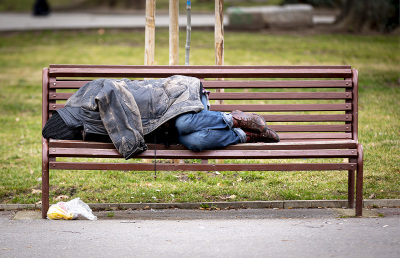My homelessness gave me a heart for the homeless

Back in 1980, long before homelessness became rampant, my newlywed husband and I were homeless. We didn’t see ourselves as homeless, because we had an old truck, and it gave us a place to live, sleep, eat, and use for transportation. Our family knew about our lifestyle, and probably wished it were different, but we were in college, and they allowed us to transition into married life and adulthood responsibilities without interference.
We were not mentally ill, nor did we have drug addiction issues, we were just poor. We were spending all the money we had on college tuition, food, gas, and the few things we needed to get by.
Besides our college classes, we cut and sold firewood to pay our bills. It was hard work and required us to empty our “home” and use it to take firewood to customers.
I remember how it felt to wake up cold, with moisture all around from the incessant Pacific Northwest rains. I remember what it was like to purchase post-dated food because it was cheaper. We relied on government handouts — which back then were food stamp booklets that everyone behind you in the grocery line could see you using.
I recall more than a few times being called “white trash” because of our dirty work clothes, rusty truck, and our ragged appearance to those on the other side of the poverty line. It hurt because we were trying so hard. Yet, there we were, in clothes we’d gotten from a free bin and wearing shoes that had holes.
Eventually we got jobs and moved into various rental apartments on our way to more sustainable living. It took a solid five years to rise up out of our financial abyss. So, as I see the homeless encampments in our larger cities, and especially when I see the rain tarps draped over tents out in the woods where I live, I know what that feels like.
It has gotten so much more complicated in the 40 years since I was homeless. Certainly, illicit drugs are a factor in homelessness. So is the rampant mental illness that seems to be pitching people out onto the streets with nowhere to go for treatment. The solutions are big and complicated, so we need to look at community-sized efforts.
In the small rural school where I volunteer, 10% of the students are homeless. They sleep outside in tents, or wherever the family can find to park a car, but some students in high school are often on their own. What is the likelihood of overcoming homelessness if they struggle to even get to school?
Rural and urban homelessness look much the same, but there are fewer resources in small communities. So, our group of community volunteers use donations and grants to help provide food, clothing, and some financial resources for students and families. None of us are wealthy enough to sweep in and provide instant housing, but we help each day.
And the best thing we offer the homeless children is hope. We give them an education that will provide a foundation beyond high school. Through scholarships and the assistance that is offered through educational grants, these students are going on to trade school and college. They understand homelessness in ways we wish they didn’t, but they also have a special brand of courage to rise up and live beyond poverty.
We all see the homelessness, and sometimes cast judgment like the people who once called me white trash, but I urge you to see the hurting people God sees.
Here in America, December 21 is National Homeless Persons’ Remembrance Day. This takes place on the longest night of the year — winter solstice. It’s the coldest and darkest time for more than just the winter season. Being homeless is life threatening. And some don’t survive homelessness.
Whether you donate to the homeless shelters in your area, help the homeless through your church, or volunteer at your local schools — there are more homeless children than you probably realize. Give the gift of your time — this doesn’t even require your money, but when you help a child, you are truly helping the future for us all.
“Whoever is kind to the poor lends to the Lord, and he will reward them for what they have done” (Proverbs 19:17).
Karen Farris saw the need to help underserved kids while serving in a youth ministry that gave her the opportunity to visit rural schools on the Olympic Peninsula. She now volunteers her time grant writing to bring resources to kids in need. She also shares stories of faith in action for those needing a dose of hope on her weekly blog, Friday Tidings.www.fridaytidings.com





















